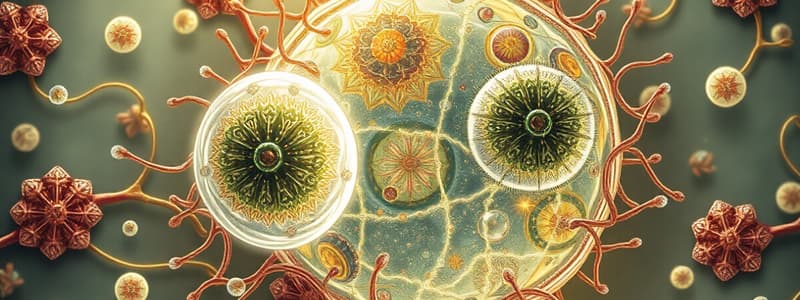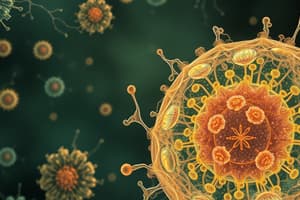Podcast
Questions and Answers
Which of the following statements is a core tenet of the established cell theory?
Which of the following statements is a core tenet of the established cell theory?
- New cells can arise spontaneously from non-living matter.
- All living organisms are composed of one or more cells. (correct)
- Cells can only be created in a laboratory setting.
- Viruses are living cells.
What is the primary distinction between eukaryotic and prokaryotic cells?
What is the primary distinction between eukaryotic and prokaryotic cells?
- Prokaryotic cells contain membrane-bound organelles, including a nucleus.
- Eukaryotic cells have a nucleus and membrane-bound organelles, while prokaryotic cells do not. (correct)
- Prokaryotic cells are larger and more complex than eukaryotic cells.
- Eukaryotic cells lack genetic material.
Which of the following best describes the function of organelles in eukaryotic cells?
Which of the following best describes the function of organelles in eukaryotic cells?
- They carry out specific functions necessary for the cell’s survival. (correct)
- They prevent the cell from reproducing.
- They store waste products for removal from the organism.
- They provide structural support to the cell wall.
Which of the following organisms is composed of prokaryotic cells?
Which of the following organisms is composed of prokaryotic cells?
According to cell theory, where do all cells originate?
According to cell theory, where do all cells originate?
What is the primary function of the cell membrane?
What is the primary function of the cell membrane?
Which organelle is responsible for generating energy in the cell?
Which organelle is responsible for generating energy in the cell?
What is the primary function of the endoplasmic reticulum (ER)?
What is the primary function of the endoplasmic reticulum (ER)?
Which of the following is a function of Golgi bodies?
Which of the following is a function of Golgi bodies?
What is the function of vacuoles in cells?
What is the function of vacuoles in cells?
Where is the cell's genetic information stored?
Where is the cell's genetic information stored?
What are the waste products of cellular respiration in mitochondria?
What are the waste products of cellular respiration in mitochondria?
What is the composition of the cytoplasm?
What is the composition of the cytoplasm?
Which of the following structures are found uniquely in plant cells, but not animal cells?
Which of the following structures are found uniquely in plant cells, but not animal cells?
The cell membrane's ability to allow some molecules to pass through while restricting others is known as:
The cell membrane's ability to allow some molecules to pass through while restricting others is known as:
Flashcards
Cell Theory
Cell Theory
A fundamental concept stating that all living things are made of cells, which are the basic units of life and come from pre-existing cells.
Prokaryotes
Prokaryotes
Cells without a nucleus or membrane-bound organelles, such as bacteria.
Eukaryotes
Eukaryotes
Cells that contain a nucleus and organelles, such as plants and animals.
Organelle
Organelle
Signup and view all the flashcards
Basic Unit of Life
Basic Unit of Life
Signup and view all the flashcards
Cytoplasm
Cytoplasm
Signup and view all the flashcards
Cell Membrane
Cell Membrane
Signup and view all the flashcards
Nucleus
Nucleus
Signup and view all the flashcards
Mitochondria
Mitochondria
Signup and view all the flashcards
Endoplasmic Reticulum (ER)
Endoplasmic Reticulum (ER)
Signup and view all the flashcards
Golgi Bodies
Golgi Bodies
Signup and view all the flashcards
Vacuoles
Vacuoles
Signup and view all the flashcards
Cell Wall
Cell Wall
Signup and view all the flashcards
Chloroplasts
Chloroplasts
Signup and view all the flashcards
Semi-permeable
Semi-permeable
Signup and view all the flashcards
Study Notes
The Cell and Cell Theory
- Cells are the smallest unit of life
- Modern biology is based on the ideas in the cell theory
The Cell Theory
- All living things are made up of one or more cells
- Cells are the basic units of life and carry out all life processes
- All cells come from pre-existing cells
Two Types of Cells:
Prokaryotes
- Cells that do not contain a nucleus or other membrane-bound organelles
- Ex. E. coli bacteria
Eukaryotes
- Cells that contain a nucleus and other organelles, each surrounded by a thin membrane
- Ex. Amoeba, whale, plant
- Eukaryotes have specialized parts called organelles that carry out specific functions necessary for life.
Studying That Suits You
Use AI to generate personalized quizzes and flashcards to suit your learning preferences.




